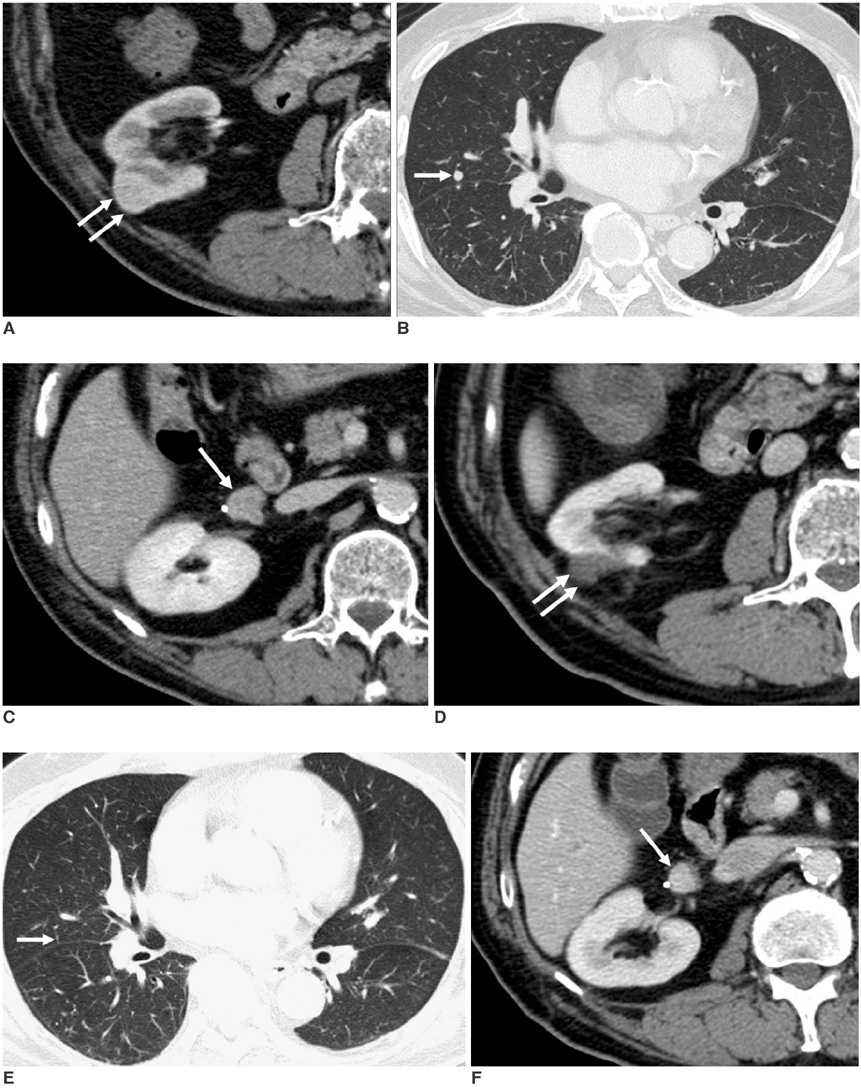Korean J Radiol.
2008 Oct;9(5):470-472. 10.3348/kjr.2008.9.5.470.
Spontaneous Regression of Pulmonary and Adrenal Metastases Following Percutaneous Radiofrequency Ablation of a Recurrent Renal Cell Carcinoma
- Affiliations
-
- 1Department of Radiology and Center for Imaging Science, Samsung Medical Center, Sungkyunkwan University School of Medicine, Seoul, Korea. rapark@skku.edu
- KMID: 1385408
- DOI: http://doi.org/10.3348/kjr.2008.9.5.470
Abstract
- The spontaneous regression of metastatic lesions from renal cell carcinoma (RCC) is extremely rare, but may be encountered following cytoreductive treatments. We report a case of a recurrent RCC with multiple metastatic lesions which spontaneously regressed after undergoing radiofrequency ablation of the renal tumor.
MeSH Terms
-
Adrenal Gland Neoplasms/radiography/*secondary
Aged, 80 and over
Carcinoma, Renal Cell/radiography/*secondary/*surgery
*Catheter Ablation
Humans
Kidney Neoplasms/*pathology/radiography/*surgery
Lung Neoplasms/radiography/*secondary
Male
Neoplasm Recurrence, Local
Remission, Spontaneous
Tomography, X-Ray Computed
Figure
Reference
-
1. Nakano E, Sonoda T, Fujioka H, Okuyama A, Matsuda M, Osafune M, et al. Spontaneous regression of pulmonary metastases after nephrectomy for renal cell carcinoma. Eur Urol. 1984. 10:212–213.2. Marcus SG, Choyke PL, Reiter R, Jaffe GS, Alexander RB, Linehan WM, et al. Regression of metastatic renal cell carcinoma after cytoreductive nephrectomy. J Urol. 1993. 150:463–466.3. Wyczolkowski M, Klima W, Bieda W, Walas K. Spontaneous regression of hepatic metastases after nephrectomy and metastasectomy of renal cell carcinoma. Urol Int. 2001. 66:119–120.4. Lokich J. Spontaneous regression of metastatic renal cancer. Case report and literature review. Am J Clin Oncol. 1997. 20:416–418.5. Snow RM, Schellhammer PF. Spontaneous regression of metastatic renal cell carcinoma. Urology. 1982. 20:177–181.6. Fairlamb DJ. Spontaneous regression of metastases of renal cancer: a report of two cases including the first recorded regression following irradiation of a dominant metastasis and review of the world literature. Cancer. 1981. 47:2102–2106.7. Sanchez-Ortiz RF, Tannir N, Ahrar K, Wood CG. Spontaneous regression of pulmonary metastases from renal cell carcinoma after radio frequency ablation of primary tumor: an in situ tumor vaccine? J Urol. 2003. 170:178–179.8. Negrier S, Escudier B, Lasset C, Douillard JY, Savary J, Chevreau C, et al. Recombinant human interleukin-2, recombinant human interferon alfa-2a, or both in metastatic renal-cell carcinoma. Groupe Français d'Immunotherapie. N Engl J Med. 1998. 338:1272–1278.
- Full Text Links
- Actions
-
Cited
- CITED
-
- Close
- Share
- Similar articles
-
- Case report of trans-renal ablation procedures for a recurrent pheochromocytoma in von Hippel-Lindau disease
- Percutaneous Adrenal Radiofrequency Ablation: A Short Review for Endocrinologists
- Spontaneous Regression of Primary Renal Cell Carcinoma: A Case Report
- Marked Regression of Bilateral Pulmonary Metastases: Report of A Case Renal Cell Carcinoma after Nephrectomy and Medroxyprogesterone Acetate Therapy
- Spontaneous Regression of Multiple Pulmonary Metastases of Advanced Renal Cell Carcinoma: A Case Report


